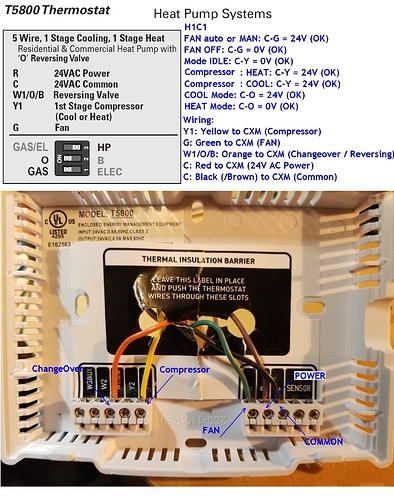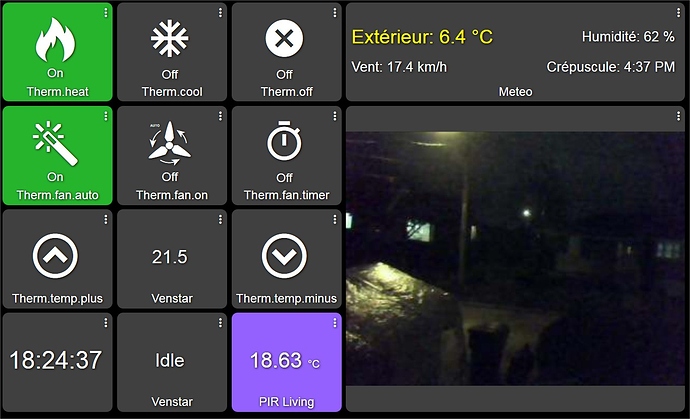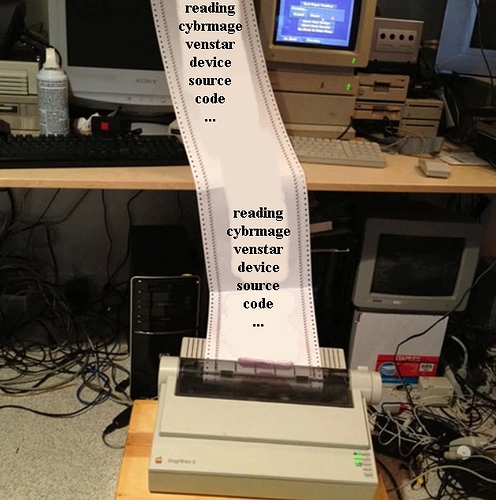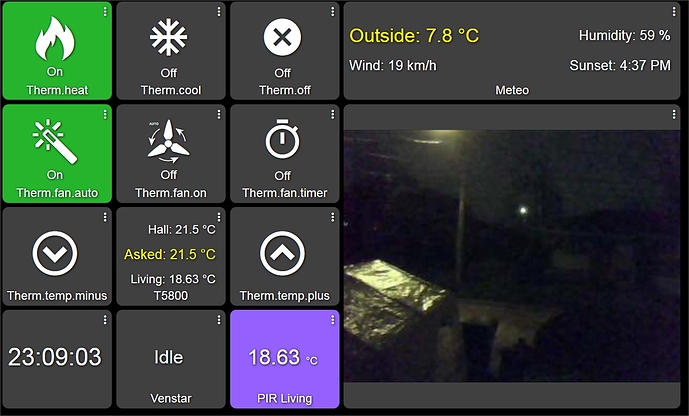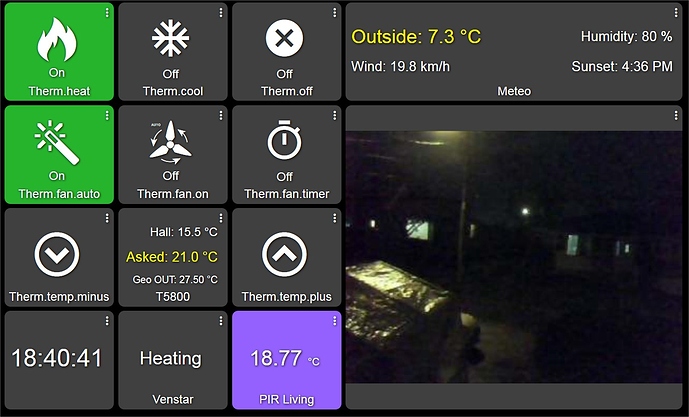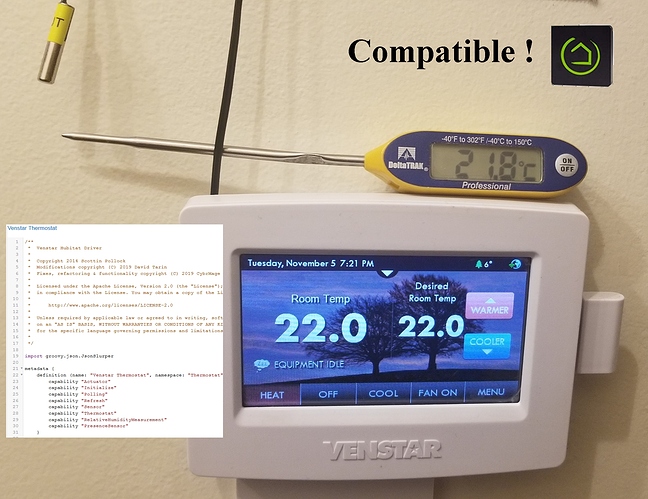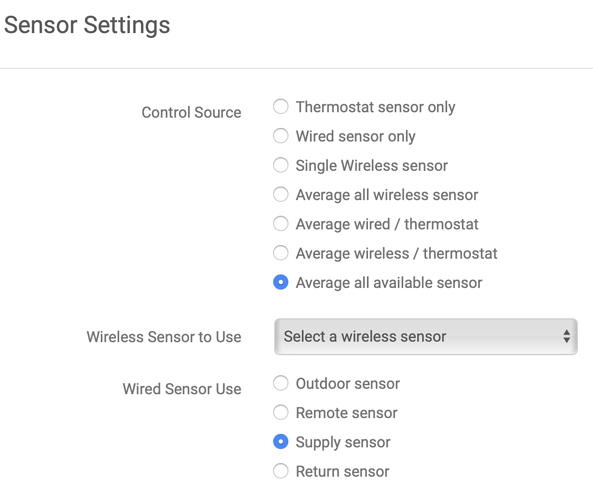Here is another update featuring:
- various bug fixes
- added "Presence Sensor" capability to track Home (present)/ Away (not present) status on the thermostat
- added "Relative Humidity Measurement" capability to allow a built-in humidity sensor (if available on the thermostat) to provide data to a dashboard "humidity" tile
- "Enable sensor child devices" parameter that create child devices for external temperature and humidity sensor that are connected to the thermostat
/**
* Venstar Hubitat Driver
*
* Copyright 2014 Scottin Pollock
* Modifications copyright (C) 2019 David Tarin
* Fixes, refactoring & functionality copyright (C) 2019 CybrMage
*
* Licensed under the Apache License, Version 2.0 (the "License"); you may not use this file except
* in compliance with the License. You may obtain a copy of the License at:
*
* http://www.apache.org/licenses/LICENSE-2.0
*
* Unless required by applicable law or agreed to in writing, software distributed under the License is distributed
* on an "AS IS" BASIS, WITHOUT WARRANTIES OR CONDITIONS OF ANY KIND, either express or implied. See the License
* for the specific language governing permissions and limitations under the License.
*
*/
import groovy.json.JsonSlurper
metadata {
definition (name: "Venstar Thermostat", namespace: "Thermostat", author: "CybrMage, Scottin Pollock, David Tarin") {
capability "Actuator"
capability "Initialize"
capability "Polling"
capability "Refresh"
capability "Sensor"
capability "Thermostat"
capability "RelativeHumidityMeasurement"
capability "PresenceSensor"
}
preferences {
section("Driver config") {
input "thermostatIP", "text", title: "Thermostat IP", required: false
def pollRate = ["1" : "Poll every minute", "5" : "Poll every 5 minutes", "10" : "Poll every 10 minutes", "15" : "Poll every 15 minutes", "30" : "Poll every 30 minutes", "60" : "Poll every hour", "180" : "Poll every 3 hours"]
input ("Poll_Rate", "enum", title: "Device Poll Rate", options: pollRate, defaultValue: "10")
input name: "sensorEnable", type: "bool", title: "Enable sensor child devices", defaultValue: false
input name: "logEnable", type: "bool", title: "Enable debug logging", defaultValue: true
input name: "testMode", type: "bool", title: "Enable offline test mode", defaultValue: false
}
}
}
private getVERSION() { "v0.9" }
// parse events into attributes
def parseJsonData(result) {
log.debug("parseJsonData: data is: $result")
if (result.success != null){
//Do nothing as nothing can be done. (runIn doesn't appear to work here and apparently you can't make outbound calls here)
if (logEnable) log.debug "parseJsonData: getapi()/postapi() data indicates success"
return
}
if (result.error != null){
log.debug "parseJsonData: getapi()/postapi() data indicates error: ${result.reason}"
return
}
if (result.mode != null){
log.debug "parseJsonData: parsing result.mode"
def mode = getModeMap()[result.mode]
state.thermostatMode = result.mode
if(device.currentState("thermostatMode")?.value != mode){
sendEvent(name: "thermostatMode", value: mode, descriptionText: "thermostatMode set to ${mode}", isStateChange: true)
}
}
if (result.state != null){
log.debug "parseJsonData: parsing result.state"
def mode = getOperatingModeMap()[result.state]
state.thermostatOperatingState = result.state
if(device.currentState("thermostatOperatingState")?.value != mode){
sendEvent(name: "thermostatOperatingState", value: mode, descriptionText: "thermostatOperatingState set to ${mode}", isStateChange: true)
}
}
if (result.fan != null){
log.debug "parseJsonData: parsing result.fan"
def fan = getFanModeMap()[result.fan]
state.thermostatFanMode = result.fan
if (device.currentState("thermostatFanMode")?.value != fan){
sendEvent(name: "thermostatFanMode", value: fan, descriptionText: "thermostatFanMode set to ${fan}", isStateChange: true)
}
}
if (result.fanstate != null){
log.debug "parseJsonData: parsing result.fanstate"
def mode = (result.fanstate == 0)?"off":"on"
state.thermostatFanOperatingState = result.fanstate
if(device.currentState("thermostatFanOperatingState")?.value != mode){
sendEvent(name: "thermostatFanOperatingState", value: mode, descriptionText: "thermostatFanOperatingState set to ${mode}", isStateChange: true)
}
}
if (result.tempunits != null){
log.debug "parseJsonData: parsing result.tempunits"
def temperatureScale = ((result.tempunits as Integer) == 0) ? "F" : "C"
state.temperatureScale = temperatureScale
if (device.currentState("temperatureScale")?.value != temperatureScale.toString()){
sendEvent(name: "temperatureScale", value: temperatureScale, descriptionText: "temperatureScale set to ${temperatureScale}", isStateChange: true)
}
} else {
if (result.spacetemp != null){
def temp = result.spacetemp
if (temp < 32) {
state.temperatureScale = "C"
} else {
state.temperatureScale = "F"
}
} else {
state.temperatureScale = "F"
}
sendEvent(name: "temperatureScale", value: temperatureScale, descriptionText: "temperatureScale set to ${temperatureScale}", isStateChange: true)
}
if (result.cooltempmin != null){
log.debug "parseJsonData: parsing result.cooltempmin"
state.cooltempmin = result.cooltempmin
}
if (result.cooltempmax != null){
log.debug "parseJsonData: parsing result.cooltempmax"
state.cooltempmax = result.cooltempmax
}
if (result.heattempmin != null){
log.debug "parseJsonData: parsing result.heattempmin"
state.heattempmin = result.heattempmin
}
if (result.heattempmax != null){
log.debug "parseJsonData: parsing result.heattempmax"
state.heattempmax = result.heattempmax
}
if (result.cooltemp != null){
log.debug "parseJsonData: parsing result.cooltemp"
def cooltemp = (getTemperatureHE(result.cooltemp) as Float).round(1)
state.cooltemp = result.cooltemp
if (device.currentState("coolingSetpoint")?.value != cooltemp.toString()){
sendEvent(name: "coolingSetpoint", value: cooltemp, descriptionText: "coolingSetpoint set to ${cooltemp}", isStateChange: true)
}
}
if (result.heattemp != null){
log.debug "parseJsonData: parsing result.heattemp"
def heattemp = (getTemperatureHE(result.heattemp) as Float).round(1)
state.heattemp = result.heattemp
if (device.currentState("heatingSetpoint")?.value != heattemp.toString()){
sendEvent(name: "heatingSetpoint", value: heattemp, , descriptionText: "Heating setpoint set to ${heattemp}", isStateChange: true)
}
}
if (result.spacetemp != null){
log.debug "parseJsonData: parsing result.spacetemp"
def temp = (getTemperatureHE(result.spacetemp) as Float).round(1)
state.temperature = result.spacetemp
if (device.currentState("temperature")?.value != spacetemp.toString()){
sendEvent(name: "temperature", value: temp, descriptionText: "temperature set to ${temp}", isStateChange: true)
}
}
if (result.state != null){
if ( state.thermostatOperatingState == 2) {
state.thermostatSetpoint = state.cooltemp
} else {
state.thermostatSetpoint = state.heattemp
}
sendEvent(name: "thermostatSetpoint", value: (getTemperatureHE(state.thermostatSetpoint) as Float).round(1), descriptionText: "thermostatSetpoint set to ${(getTemperatureHE(state.thermostatSetpoint) as Float).round(1)}", isStateChange: true)
}
if (result.away != null){
log.debug "parseJsonData: parsing result.away"
def mode = getAwayModes()[result.away]
state.presence = result.away
if(device.currentState("presence")?.value != mode){
sendEvent(name: "presence", value: mode, descriptionText: "presence set to ${mode}", isStateChange: true)
}
}
if (result.hum != null){
log.debug "parseJsonData: parsing result.hum"
state.humidity = result.hum
if(device.currentState("humidity")?.value != mode){
sendEvent(name: "humidity", value: state.humidity, descriptionText: "humidity set to ${mode}", isStateChange: true)
}
}
if (result.sensors != null) {
log.debug "parseJsonData: parsing SENSOR data"
result.sensors.each { sensor ->
def sensorDNI = device.deviceNetworkId + "-ep" + sensor.name.replaceAll("\\s","").replaceAll("\\W","")
def targetChild = getChildDevice(sensorDNI)
if (targetChild != null) {
log.debug "parseJsonData: updating SENSOR data for "+sensorDNI
if (sensor.temp != null) targetChild.setTemperature(sensor.temp)
if (sensor.hum != null) targetChild.setHumidity(sensor.hum)
} else {
log.warn "parseJsonData: child SENSOR does not exist for "+sensorDNI
}
}
}
}
def poll() {
log.debug("poll: Executing 'poll'")
sendEvent(descriptionText: "poll keep alive", isStateChange: false) // workaround to keep polling from being shut off
refresh()
}
def modes() {
["off", "heat", "cool", "auto"]
}
def parseDescriptionAsMap(description) {
description.split(",").inject([:]) { map, param ->
def nameAndValue = param.split(":")
map += [(nameAndValue[0].trim()):nameAndValue[1].trim()]
}
}
def getAwayModes() { [
0:"present",
1:"not present"
]}
def getModeMap() { [
0:"off",
2:"cool",
1:"heat",
3:"auto"
]}
def getOperatingModeMap() { [
0: "Idle",
1: "Heating",
2: "Cooling",
3: "Lockout",
4: "Error"
]}
def getFanModeMap() {[
0:"fanAuto",
1:"fanOn"
]}
def clampTemp(temp) {
def T1 = Math.floor(temp)
def T2 = temp - T1
def T3 = 0
if ((T2 >= 0.25) && (T2 <= 0.75)) {
T3 = 0.5
} else if (T2 > 0.75) {
T3 = 1.0
}
def T4 = T1 + T3
if (logEnable) log.debug(" clampTemp: triming value ${temp} to ${T4}")
return T4
}
def getTemperatureHE(value) {
if (logEnable) log.debug(" getTemperatureHE: testing for temperature scale conversion for temperature value ${value}")
def scaleHE = getTemperatureScale()
def scaleVS = (device.currentState("temperatureScale")?.value)?(device.currentState("temperatureScale")?.value):state.temperatureScale
log.debug(" getTemperatureHE: temperatureScale - HE = ${scaleHE} VS = ${scaleVS}")
if ( !scaleHE || !scaleVS || (scaleHE == scaleVS)) {
value = clampTemp(value)
if (logEnable) log.debug(" getTemperatureHE: no temperature scale conversion required for temperature value ${value}")
return value
}
if ((scaleVS == "F") && (scaleHE == "C")) {
// F to C
def tempC = (((value-32)*5.0)/9.0)
tempC = clampTemp(tempC)
if (logEnable) log.warn(" getTemperatureHE: temperature scale conversion required. temperature value ${value}F = ${tempC}C")
return tempC
} else {
// C to F
def tempF = (((value * 9.0)/5.0)+32)
tempF = clampTemp(tempF)
if (logEnable) log.warn(" getTemperatureHE: temperature scale conversion required. temperature value ${value}C = ${tempF}F")
return tempF
}
}
def getTemperatureVS(value) {
if (logEnable) log.debug(" getTemperatureVS: testing for temperature scale conversion for temperature value ${value}")
def scaleHE = getTemperatureScale()
def scaleVS = (device.currentState("temperatureScale")?.value)?(device.currentState("temperatureScale")?.value):state.temperatureScale
log.debug(" getTemperatureVS: temperatureScale - VS = ${scaleVS} HE = ${scaleHE}")
if ( !scaleHE || !scaleVS || (scaleHE == scaleVS)) {
value = clampTemp(value)
if (logEnable) log.debug(" getTemperatureVS: no temperature scale conversion required for temperature value ${value}")
return value
}
if ((scaleHE == "F") && (scaleVS == "C")) {
// F to C
def tempC = (((value-32)*5.0)/9.0)
tempC = clampTemp(tempC)
if (logEnable) log.warn(" getTemperatureVS: temperature scale conversion required. temperature value ${value}F = ${tempC}C")
return tempC
} else {
// C to F
def tempF = (((value * 9.0)/5.0)+32)
tempF = clampTemp(tempF)
if (logEnable) log.warn(" getTemperatureVS: temperature scale conversion required. temperature value ${value}C = ${tempF}F")
return tempF
}
}
// handle commands
def getValidHeatSetpoint(newTemp) {
if (logEnable) log.debug(" getValidHeatSetpoint: testing heat setpoint for temperature value ${newTemp}")
if (!state.heattempmin || !state.heattempmax) {
if (logEnable) log.debug(" getValidHeatSetpoint: no restriction for temperature value ${newTemp}")
return newTemp
}
def minTemp = state.heattempmin as Integer
def maxTemp = state.heattempmax as Integer
if (newTemp < minTemp) {
if (logEnable) log.warn(" getValidHeatSetpoint: heat setpoint restricted to minimum temperature value ${minTemp}")
return minTemp
} else if (newTemp > maxTemp) {
if (logEnable) log.warn(" getValidHeatSetpoint: heat setpoint restricted to maximum temperature value ${maxTemp}")
return maxTemp
} else {
if (logEnable) log.debug(" getValidHeatSetpoint: no restriction for temperature value ${newTemp}")
return newTemp
}
}
def getValidCoolSetpoint(newTemp) {
if (logEnable) log.debug(" getValidCoolSetpoint: testing cool setpoint for temperature value ${newTemp}")
if (!state.cooltempmin || !state.cooltempmax) {
if (logEnable) log.debug("getValidCoolSetpoint: no restriction for temperature value ${newTemp}")
return newTemp
}
def minTemp = state.cooltempmin as Integer
def maxTemp = state.cooltempmax as Integer
if (newTemp < minTemp) {
if (logEnable) log.warn(" getValidCoolSetpoint: cool setpoint restricted to minimum temperature value ${minTemp}")
return minTemp
} else if (newTemp > maxTemp) {
if (logEnable) log.warn(" getValidCoolSetpoint: cool setpoint restricted to maximum temperature value ${maxTemp}")
return maxTemp
} else {
if (logEnable) log.debug(" getValidCoolSetpoint: no restriction for temperature value ${newTemp}")
return newTemp
}
}
def setCommonSetpoint() {
if ( state.thermostatOperatingState == 2) {
state.thermostatSetpoint = state.cooltemp
} else {
state.thermostatSetpoint = state.heattemp
}
def newTemp = clampTemp(getTemperatureHE(state.thermostatSetpoint))
if (logEnable) log.debug " setCommonSetpoint: Executing 'setCommonSetpoint' with ${newTemp} (originally - ${state.thermostatSetpoint})"
sendEvent(name: "thermostatSetpoint", value: newTemp, descriptionText: "thermostatSetpoint set to ${newTemp}", isStateChange: true)
}
def setHeatingSetpoint(degrees) {
if (logEnable) log.debug "Executing 'setHeatingSetpoint' with ${degrees}"
def degreesHE = clampTemp(degrees)
def degreesVS = getTemperatureVS(degreesHE)
state.heattemp = getValidHeatSetpoint(degreesVS)
if (state.heattemp != degreesVS) {
// temperature was restricted - convert restricted temperature back to HE format
degreesHE = getTemperatureHE(degreesVS)
}
if (logEnable) log.debug "processing 'setHeatingSetpoint' with ${degreesHE} (originally ${degrees})"
setCommonSetpoint()
sendEvent(name: "heatingSetpoint", value: degreesHE, descriptionText: "Heating setpoint set to ${degreesHE}", isStateChange: true)
postapi()
}
def setCoolingSetpoint(degrees) {
if (logEnable) log.debug "Executing 'setCoolingSetpoint' with ${degrees}"
def degreesHE = clampTemp(degrees)
def degreesVS = getTemperatureVS(degreesHE)
state.cooltemp = getValidCoolSetpoint(degreesVS)
if (state.cooltemp != degreesVS) {
// temperature was restricted - convert restricted temperature back to HE format
degreesHE = getTemperatureHE(degreesVS)
}
if (logEnable) log.debug "processing 'setCoolingSetpoint' with ${degreesHE} (originally ${degrees})"
sendEvent(name: "coolingSetpoint", value: degreesHE, descriptionText: "Cooling setpoint set to ${degreesHE}", isStateChange: true)
setCommonSetpoint()
postapi()
}
def off() {
log.debug "Executing 'off'"
state.thermostatMode = 0
sendEvent(name: "thermostatMode", value: getModeMap()[0], descriptionText: "Thermostat Mode set to ${getModeMap()[0]}", isStateChange: true)
postapi()
}
def heat() {
log.debug "Executing 'heat'"
state.thermostatMode = 1
sendEvent(name: "thermostatMode", value: getModeMap()[1], descriptionText: "Thermostat Mode set to ${getModeMap()[1]}", isStateChange: true)
postapi()
}
def cool() {
log.debug "Executing 'cool'"
state.thermostatMode = 2
sendEvent(name: "thermostatMode", value: getModeMap()[2], descriptionText: "Thermostat Mode set to ${getModeMap()[2]}", isStateChange: true)
postapi()
}
def auto() {
log.debug "Executing 'auto'"
state.thermostatMode = 3
sendEvent(name: "thermostatMode", value: getModeMap()[3], descriptionText: "Thermostat Mode set to ${getModeMap()[3]}", isStateChange: true)
postapi()
}
def emergencyHeat() {
log.error "'emergencyHeat' is not supported by this device"
}
def setSchedule(String json) {
log.error "'setSchedule' is not supported by this device driver"
}
def setThermostatMode(String newMode) {
log.debug("setThermostatMode(${newMode})")
switch(newMode) {
case "off":
off()
break
case "heat":
heat()
break
case "cool":
cool()
break
case "auto":
auto()
break
default:
log.error("setThermostatMode: mode '${newMode}' is not supported by this device")
break
}
}
def fanOn() {
log.debug "Executing 'fanOn'"
state.thermostatFanMode = 1
sendEvent(name: "thermostatFanMode", value: getFanModeMap()[1], descriptionText: "Thermostat Fan Mode set to ${getFanModeMap()[1]}", isStateChange: true)
postapi()
}
def fanAuto() {
log.debug "Executing 'fanAuto'"
state.thermostatFanMode = 0
sendEvent(name: "thermostatFanMode", value: getFanModeMap()[0], descriptionText: "Thermostat Fan Mode set to ${getFanModeMap()[0]}", isStateChange: true)
postapi()
}
def fanCirculate() {
log.error("'fanCirculate' is not supported by this device")
}
def setThermostatFanMode(String newMode) {
log.debug("setThermostatFanMode(${newMode.trim()})")
switch(newMode.trim()) {
case "on":
case "fanOn":
fanOn()
break
case "auto":
case "fanAuto":
fanAuto()
break
default:
log.error("setThermostatFanMode: mode '${newMode}' is not supported by this device")
break
}
}
def refresh() {
log.debug "Executing 'refresh'"
getapi()
if (sensorEnable) {
log.warn "Executing 'SENSOR refresh'"
getSensors()
}
}
private getapi() {
def uri = "http://"+getHostAddress()+"/query/info"
log.debug("getapi: Executing get api to " + uri)
if (testMode) uri = "http://127.0.0.1/api/json/utc/now"
try {
def requestParams =
[
uri: uri,
requestContentType: "application/x-www-form-urlencoded",
contentType: "application/json"
]
httpGet(requestParams) { resp ->
if (resp.status == 200) {
if (logEnable) log.debug "getapi: httpGet returned: \n${resp.data}"
parseJsonData(resp.data)
} else {
log.debug("getapi: httpPost returned http failure code ${resp.status}")
}
if (logEnable) log.debug "getapi: getapi() completed"
}
} catch (Exception e) {
if (testMode && (e.message == "Connect to 127.0.0.1:80 [/127.0.0.1] failed: Connection refused (Connection refused)")) {
return parseJsonData(testDATA())
}
log.error "getapi: Call to getapi() failed: ${e.message}"
}
}
private createModeChangeCommand(){
def command = "mode=" + state.thermostatMode +
"&fan=" + state.thermostatFanMode +
"&heattemp=" + state.heattemp +
"&cooltemp=" + state.cooltemp
return command
}
private postapi() {
if (logEnable) log.info("postapi: Executing API Control update")
def uri = "http://"+getHostAddress()+"/control"
def command = createModeChangeCommand()
if (logEnable) {
if (testMode) {
log.info("postapi: Test Mode: POST request to [${uri}] with command [${command}]")
} else {
log.info("postapi: Sending on POST request to [${uri}] with command [${command}]")
}
}
if (testMode) {
return getapi()
}
def postParams = [
uri: uri,
contentType: "application/json",
requestContentType: "application/x-www-form-urlencoded",
body : command
]
try {
httpPost(postParams) { resp ->
if (resp.status == 200) {
if (logEnable) log.debug "postapi: httpPost returned: \n${resp.data}"
if (resp.data.success == true) {
if(logEnable) log.debug("postapi: httpGet returned success")
// update the thermostat state
getapi()
} else{
if(logEnable) log.debug("postapi: httpGet returned success")
}
} else {
log.debug("postapi: httpPost returned http failure code ${resp.status}")
}
}
} catch (Exception e) {
log.error "postapi: Call to postapi(${command}) failed: ${e.message}"
}
}
//helper methods
private getHostAddress() {
return settings.thermostatIP
}
// driver default methods
def updated() {
log.debug("updated: Venstar Driver ${VERSION} - Updating parameters")
initialize()
}
def installed() {
log.debug("installed: Venstar Driver ${VERSION} - Installed")
}
def initialize() {
log.debug("initialize: Venstar Driver ${VERSION} - Initializing device ${device.getDeviceNetworkId()}")
unschedule()
sendEvent(name: "temperatureDisplayScale", value: getTemperatureScale(), descriptionText: "temperatureDisplayScale set to ${getTemperatureScale()}", isStateChange: true)
sendEvent(name: "supportedThermostatFanModes", value: [fanAuto,fanOn], isStateChange: true)
sendEvent(name: "supportedThermostatModes", value: [off,heat,cool,auto], isStateChange: true)
if (getHostAddress()) {
// get the initial thermostat state
if (sensorEnable) {
def sensorData = getSensors(true)
createSensors(sensorData)
} else {
// remove child sensors if needed
getChildDevices().each { sensor ->
log.debug ("removing disabled sensor ${sensor.deviceNetworkId}")
deleteChildDevice(sensor.deviceNetworkId)
}
}
getapi()
} else {
log.debug("initialize: Venstar IP Address not set")
return
}
def poll = Poll_Rate ? Poll_Rate : "10"
switch(poll) {
case "1" :
runEvery1Minute(refresh)
log.debug("initialize: Poll Rate set to every 1 minute")
break
case "5" :
runEvery5Minutes(refresh)
log.debug("initialize: Poll Rate set to every 5 minutes")
break
case "10" :
runEvery10Minutes(refresh)
log.debug("initialize: Poll Rate set to every 10 minutes")
break
case "15" :
runEvery15Minutes(refresh)
log.debug("initialize: Poll Rate set to every 15 minutes")
break
case "30" :
runEvery30Minutes(refresh)
log.debug("initialize: Poll Rate set to every 30 minutes")
break
case "60" :
runEvery1hour(refresh)
log.debug("initialize: Poll Rate set to every 1 hour")
break
case "30" :
runEvery3hours(refresh)
log.debug("initialize: Poll Rate set to every 3 hours")
break
}
}
private getSensors(dataOnly = false) {
def uri = "http://"+getHostAddress()+"/query/sensors"
log.debug("getapi: Executing get api to " + uri)
if (testMode) uri = "http://127.0.0.1/query/sensors"
try {
def requestParams =
[
uri: uri,
requestContentType: "application/x-www-form-urlencoded",
contentType: "application/json"
]
httpGet(requestParams) { resp ->
if (resp.status == 200) {
if (logEnable) log.debug "getSensors: httpGet returned: \n${resp.data}"
parseJsonData(resp.data)
} else {
log.debug("getSensors: httpGet returned http failure code ${resp.status}")
}
if (logEnable) log.debug "getSensors: getSensors() completed"
}
} catch (Exception e) {
if (testMode && (e.message == "Connect to 127.0.0.1:80 [/127.0.0.1] failed: Connection refused (Connection refused)")) {
if (dataOnly) return testSensorDATA()
return parseJsonData(testSensorDATA())
}
log.error "getSensors: Call to getSensors() failed: ${e.message}"
}
}
def findChild(childDNI) {
getChildDevices()?.find { it.deviceNetworkId == childDNI}
}
def createSensors(sensorData) {
log.debug("createSensors: Parsing sensor data: " + sensorData)
def parentDNI = device.getDeviceNetworkId()
if (sensorData.sensors) {
sensorData.sensors.each { sensor ->
def sensorName = sensor.name.replaceAll("\\s","").replaceAll("\\W","")
def sensorDNI = "${device.deviceNetworkId}-ep${sensorName}"
if (sensor.temp != null) {
log.debug("createSensors: Found temperature sensor device - " + sensor.name + " DNI: "+sensorDNI)
def childDevice = findChild(sensorDNI)
if (childDevice == null) {
log.debug("createSensors: creating temperature Child "+sensorDNI)
childDevice = addChildDevice("hubitat", "Virtual Temperature Sensor", sensorDNI, [label: "${device.displayName} (temp sensor - ${sensor.name})", isComponent: false])
} else {
log.debug("createSensors: temperatureChild ${sensorDNI} already exists")
}
childDevice.setTemperature(sensor.temp)
} else if (sensor.hum != null) {
log.debug("createSensors: Found humidity sensor device - " + sensor.name + " DNI: "+sensorDNI)
def childDevice = findChild(sensorDNI)
if (childDevice == null) {
log.debug("createSensors: creating humidity Child "+sensorDNI)
childDevice = addChildDevice("hubitat", "Virtual Humidity Sensor", "${device.deviceNetworkId}-ep${sensorName}", [label: "${device.displayName} (temp sensor - ${sensor.name})", isComponent: false])
} else {
log.debug("createSensors: humidity Child ${sensorDNI} already exists")
}
childDevice.setHumidity(sensor.hum)
} else {
log.debug("createSensors: Found unknown sensor device - " + sensor.name)
}
}
}
}
def testDATA() {
def data = '{"name":"Test Data","mode":1,"state":0,"fan":0,"fanstate":1,"tempunits":1,"schedule":0,"schedulepart":255,"away":0,"spacetemp":21.0,"heattemp":21.0,"cooltemp":8.0,"cooltempmin":1.5,"cooltempmax":37.0,"heattempmin":1.5,"heattempmax":37.0,"setpointdelta":2.0,"availablemodes":1}'
def slurper = new JsonSlurper()
def result = slurper.parseText(data)
result.mode = state.thermostatMode ?: 0
result.state = state.thermostatMode ?: 0
result.fan = state.thermostatFanMode ?: 0
result.fanstate = (state.thermostatFanMode && (state.thermostatMode > 0)) ?: 0
if (state.heattemp != null) result.heattemp = state.heattemp
if (state.cooltemp!= null) result.cooltemp = state.cooltemp
return result
}
def testAlertDATA() {
def data = '{"alerts": [{"name": "Air Filter","active": false},{"name": "UV Lamp","active": false},{"name": "Service","active": false}]}'
def slurper = new JsonSlurper()
def result = slurper.parseText(data)
return result
}
def testSensorDATA() {
def data = '{"sensors": [{"name": "Thermostat","temp": 77},{"name": "Outdoor","temp": 0}]}'
def slurper = new JsonSlurper()
def result = slurper.parseText(data)
return result
}
